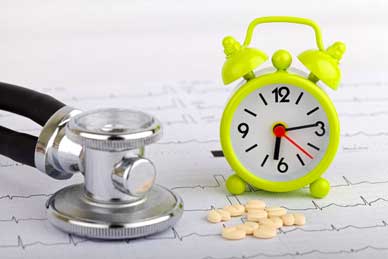Who has time for breakfast? In the modern world, many people succumb to the morning rush and run out the door with empty stomachs. However, this can have a negative effect on health in a variety of ways. People who skip breakfast tend to have lower cognition and poorer memory. A new study suggests that skipping the most important meal of the day can even increase stroke risk.
Blood Pressure and Stroke Risk
Health care workers and scientists have long acknowledged the link between blood pressure and stroke risk. In fact, there is a direct relationship between the two. High blood pressure can cause clots to break free from blood vessel walls and lodge in the delicate vessels of the brain, causing a lack of blood flow to key areas and a resulting loss of function, also known as an ischemic stroke. High blood pressure can also cause a hemorrhagic stroke, also known as a brain bleed, when the high pressure causes cerebral blood vessels to rupture.
Circadian Rhythm, Blood Pressure, and Breakfast
How can skipping breakfast contribute to stroke? While a recent study has confirmed that there is a connection, it seems to be counter-intuitive at first look. However, researchers believe that high blood pressure may be the link. Skipping a meal ultimately results in a rise in blood pressure. Because blood pressure is naturally higher in the morning, people who skip breakfast ultimately may end up with dangerously high blood pressure. The result is damage to blood vessels and a 30 percent rise in stroke risk.
Circadian Rhythm, Hypertension, and Health
 Understanding the circadian rhythm can help people to reduce their disease risk. Our bodies create hormones and other important cell proteins on a 24-hour cycle. Understanding this cycle and its effects on our bodies can help people to make better health decisions. While few people would think that eating breakfast affects their disease risk, it indeed appears to be the case. It is important to eat breakfast because it helps us to think better and function better throughout the day, but also because it keeps blood pressure from spiking, thus prevents stroke risk from soaring.
Understanding the circadian rhythm can help people to reduce their disease risk. Our bodies create hormones and other important cell proteins on a 24-hour cycle. Understanding this cycle and its effects on our bodies can help people to make better health decisions. While few people would think that eating breakfast affects their disease risk, it indeed appears to be the case. It is important to eat breakfast because it helps us to think better and function better throughout the day, but also because it keeps blood pressure from spiking, thus prevents stroke risk from soaring.
Living With Your Circadian Rhythm
Our bodies are designed to live according to a 24-hour rhythm. While modern life often interferes, it is important to keep healthy habits. There is a reason our ancestors believed in eating a healthy breakfast, even if they could not perform double-blind studies on every benefit. They understood on some innate level that our bodies were intended to work on a 24-hour cycle.
Research in chronobiology is constantly helping people to understand their bodies better and thus to reduce the chances of developing deadly disorders such as stroke. Your healthy breakfast is not just a great way to start a productive day, but a way of reducing your disease risk as well.
